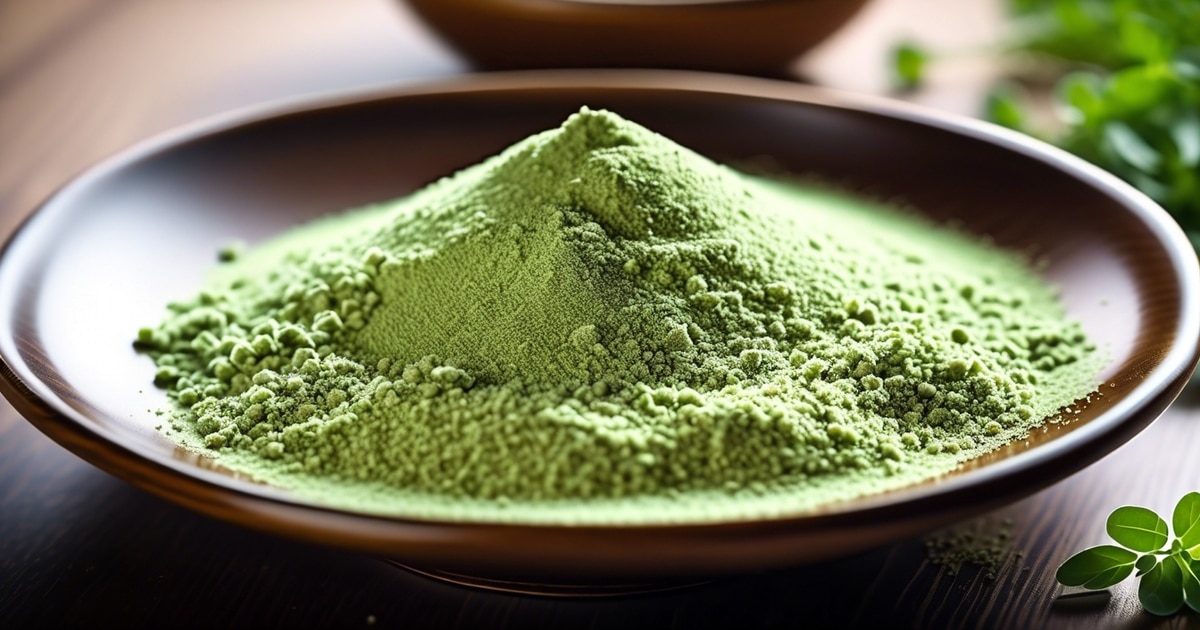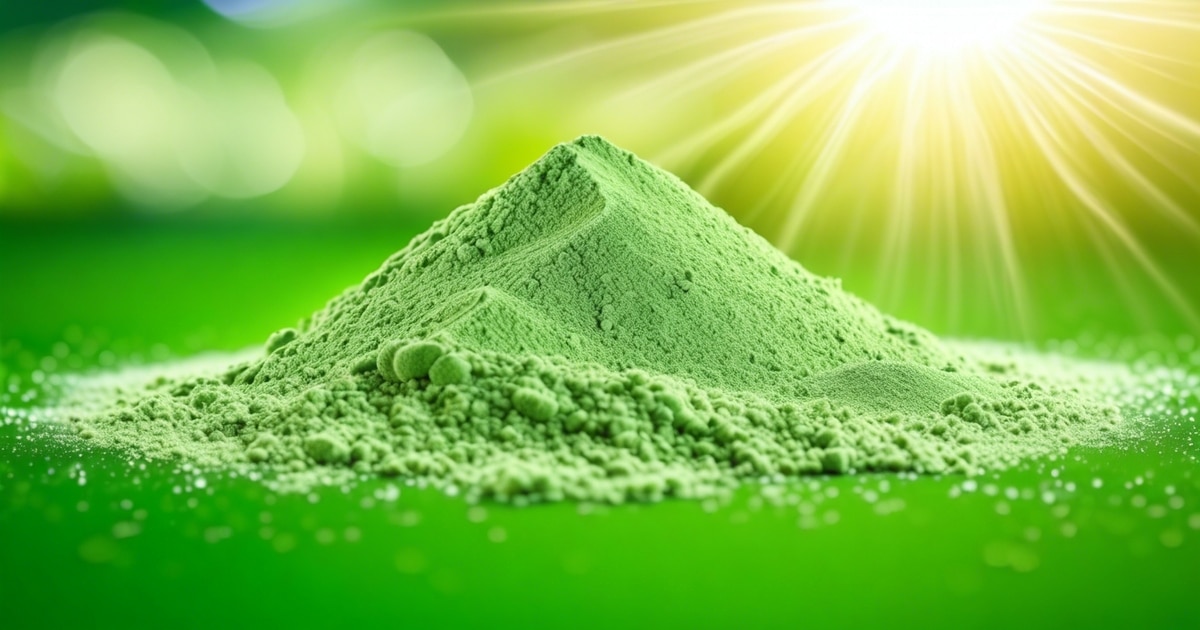Key Takeaways
-
Incorporate alfalfa powder into your diet: Add alfalfa powder to smoothies, salads, or soups to benefit from its rich nutritional profile and potential health benefits.
-
Follow recommended dosage guidelines: Adhere to the suggested dosage to avoid potential side effects and ensure safe consumption of alfalfa powder as a dietary supplement.
-
Be mindful of potential interactions: Consult with a healthcare professional to understand any potential interactions or contraindications of alfalfa powder with medications or existing health conditions.
-
Store alfalfa powder properly: Keep it in a cool, dry place and away from direct sunlight to maintain its quality and potency over time.
-
Source quality products: When selecting alfalfa powder, opt for reputable and trusted sources to ensure the product’s safety and adherence to regulatory standards.
-
Stay informed about regulatory aspects: Stay updated on the regulatory status of alfalfa in your region to ensure compliance and safety when using alfalfa powder.
Looking to supercharge your diet with a nutrient-packed supplement? Look no further than alfalfa powder. Packed with essential vitamins, minerals, and antioxidants, this green powerhouse offers many health benefits that can elevate your well-being. From aiding digestion to boosting immunity, alfalfa powder is a versatile addition to any wellness routine. But what exactly sets this superfood apart from the rest?
Alfalfa Overview and Health Benefits

Nutrient-Rich Herb
Alfalfa, scientifically known as Medicago sativa, has been valued for its medicinal properties for centuries. This herb is packed with essential nutrients, making it a valuable addition to a healthy diet. Alfalfa offers numerous health benefits with its rich content of vitamins, minerals, and antioxidants.
Alfalfa’s nutrient profile contributes to improved digestion and overall wellness. Its high fiber content supports digestive health by promoting regular bowel movements and preventing constipation. The presence of antioxidants in alfalfa helps combat oxidative stress in the body, contributing to overall well-being.
Potential Cholesterol-Lowering Effects
Studies have shown that alfalfa may have potential cholesterol-lowering effects. Research conducted on rats demonstrated that animals fed with alfalfa experienced reduced levels of LDL cholesterol (the “bad” cholesterol) while maintaining or even increasing HDL cholesterol (the “good” cholesterol). These findings suggest that incorporating alfalfa into the diet could support heart health by regulating cholesterol levels.
Alfalfa has also been traditionally used as a natural remedy for various ailments, such as arthritis, due to its anti-inflammatory properties. The herb’s ability to reduce inflammation may help alleviate symptoms associated with arthritis.
Nutritional Profile and Supplement Facts
Essential Nutrients
Alfalfa powder is a powerhouse of nutrients. It contains vital vitamins such as A, C, E, and K, essential for overall health. These vitamins support the immune system, promote healthy skin and vision, and aid blood clotting.
Moreover, alfalfa powder contains minerals like calcium, potassium, and iron. Calcium contributes to strong bones and teeth, while potassium helps regulate blood pressure. Iron is important for forming red blood cells that carry oxygen throughout the body.
Protein and Fiber Content
The supplement facts of alfalfa powder reveal its high protein and fiber content. The high protein levels make it a valuable addition to vegetarian or vegan diets as it provides an alternative source of this essential macronutrient. The significant fiber content supports digestive health by promoting regular bowel movements and preventing constipation.
Furthermore, these dietary supplements have been found to help lower cholesterol levels due to their high fiber content. By doing so, they may contribute to improved cardiovascular health.
Dosage Guidelines for Alfalfa Powder

Individualized Dosage
The recommended dosage for Alfalfa powder varies depending on individual needs and health conditions. Age, weight, and specific health goals can influence the appropriate intake. For example, individuals looking to increase their vitamin and mineral intake may require a different dosage than those seeking digestive support.
It’s crucial to consult with healthcare professionals or refer to product labels for suggested intake. These sources can provide personalized recommendations based on an individual’s unique health status and dietary requirements. By following these guidelines, individuals can ensure they consume an appropriate amount of alfalfa powder tailored to their specific needs.
Adherence Importance
Overconsumption of alfalfa powder can lead to adverse effects, underscoring the importance of adhering to dosage guidelines. Excessive intake may result in symptoms such as bloating, gas, or gastrointestinal discomfort. Therefore, individuals must exercise caution and not exceed the recommended dosage without professional guidance.
-
Users need to understand that exceeding the suggested dosage does not necessarily equate to increased benefits.
-
Adhering strictly to the recommended intake helps mitigate potential risks associated with overconsumption while maximizing the potential benefits of alfalfa powder supplementation.
Alfalfa in Dietary Supplements and Food Industry
Nutritional Value
Alfalfa powder is a popular ingredient in dietary supplements due to its high nutritional value. It contains essential vitamins, minerals, and antioxidants that benefit overall health. For example, it’s rich in vitamin K, which supports bone health and blood clotting.
Alfalfa powder is a good source of phytoestrogens, which may benefit women’s health. Phytoestrogens are plant compounds that mimic the hormone estrogen and may help alleviate symptoms associated with menopause.
In the food industry, alfalfa powder is utilized in various products, such as smoothie mixes and health bars, to enhance their nutritional content. This versatile ingredient adds a boost of nutrients without compromising taste or texture.
Versatility
The versatility of alfalfa powder makes it an attractive choice for enhancing the nutritional profile of different consumables. It can be incorporated into various recipes, including baked goods, soups, and homemade energy bites. Its mild flavor allows it to blend seamlessly with other ingredients while adding nutritional punch.
Moreover, due to its availability in multiple forms, such as capsules or loose powder form at grocery stores or online retailers, consumers can choose how they incorporate this nutritious herb into their diets based on personal preferences.
Potential Side Effects and Safety Precautions
Allergic Reactions
Some individuals may experience allergic reactions to alfalfa powder. This can manifest as symptoms like hives, itching, or difficulty breathing. It’s important to know these potential allergic responses when consuming alfalfa products.
Consumers should pay close attention to any unusual symptoms after taking alfalfa supplements or products with alfalfa as an ingredient. If any signs of an allergic reaction occur, seeking medical attention immediately is crucial.
Safety Precautions
Before using alfalfa supplements, especially for pregnant women or those with certain medical conditions, it is essential to consult a healthcare provider. This precaution is necessary due to the potential risks associated with alfalfa consumption in these specific groups.
Individuals under medication treatment should also exercise caution when considering alfalfa supplementation due to possible interactions with certain medications. Consulting a healthcare professional before incorporating alfalfa powder into their routine can help prevent adverse effects and ensure safety.
Interactions and Contraindications of Alfalfa
Drug Interactions
Alfalfa may have drug interactions with blood-thinning medications. This is due to its high vitamin K content, which plays a crucial role in blood clotting. If you are taking anticoagulants or antiplatelet drugs, consuming alfalfa powder might interfere with their effectiveness.
Consuming alfalfa alongside these medications can lead to complications such as excessive bleeding or reduced clotting ability. It’s essential to consult your healthcare provider before using alfalfa powder if you are on any blood-thinning medication.
Immune System Stimulation
Individuals with autoimmune disorders should approach alfalfa supplementation with caution. The herb has the potential to stimulate the immune system, which could exacerbate autoimmune conditions by increasing inflammation and immune response. Those with conditions like lupus, rheumatoid arthritis, or multiple sclerosis should be particularly mindful of this interaction.
For individuals with compromised immune systems or those undergoing organ transplants, the stimulatory effects of alfalfa on the immune system could pose significant risks. Therefore, such individuals must seek medical advice before incorporating alfalfa into their diet or supplement regimen.
Storing Alfalfa Powder Correctly
Importance of Proper Storage
Storing alfalfa powder correctly is crucial to maintain its quality and nutritional benefits. Keeping it in a cool, dry place helps preserve its potency by preventing moisture and sunlight exposure. This ensures that the powder retains its essential nutrients for an extended period.
Alfalfa powder contains valuable vitamins, minerals, and antioxidants that can degrade when exposed to air, light, or humidity. You can safeguard these beneficial properties by storing it in a cool, dry environment away from direct sunlight. Protecting the powder from moisture prevents clumping and spoilage.
Proper storage also plays a significant role in maintaining the flavor of alfalfa powder. The powder’s natural taste remains intact when stored correctly in an airtight container. This means each use will deliver the same fresh and flavorful experience as when you first opened the package.
Best Practices for Storage
To ensure optimal preservation of alfalfa powder, it’s essential to seal the container tightly after each use. This prevents unnecessary exposure to air, which could lead to oxidation and nutrient loss. Choosing a well-sealed container with minimal headspace reduces the risk of degradation due to contact with oxygen.
When selecting a storage location for alfalfa powder, prioritize areas that are consistently cool and free from fluctuations in temperature or humidity levels. A pantry or cupboard away from heat sources such as stoves or ovens is ideal.
Regulatory Aspects of Alfalfa Worldwide
Varying Regulations
Regulations concerning alfalfa powder differ from one country to another. For instance, in the United States, alfalfa is regulated as a crop and also for its use in animal feed. Compliance with these regulations is crucial for businesses involved in producing and distributing alfalfa products.
Understanding the specific requirements set by local regulatory authorities is essential for manufacturers and distributors of alfalfa powder. It’s important to note that compliance with these standards ensures the safety and quality of the product, which ultimately benefits both businesses and consumers.
Global Trade Implications
Understanding international regulations related to alfalfa powder becomes imperative. Countries have varying rules regarding imports and exports of agricultural products like alfalfa. Manufacturers looking to engage in global trade must ensure that their products meet local and international standards.
For example, suppose a company based in the United States wants to export alfalfa powder to Europe or Asia. In that case, they need to be aware of each region’s specific regulations on agricultural imports. This includes aspects such as labeling requirements, permissible additives, and maximum residue limits for pesticides.
Selecting Quality Alfalfa Powder Sources
Reputable Suppliers
When seeking alfalfa powder, it’s crucial to prioritize reputable suppliers. Look for companies that adhere to stringent quality control measures and possess relevant certifications. This ensures that the product meets certain standards and is safe for consumption. By choosing a trusted supplier, you can have confidence in the quality of the alfalfa powder you’re purchasing.
Organic Options
Consider opting for organic alfalfa powder to minimize potential exposure to pesticides or contaminants. Organic products are cultivated without synthetic chemicals, making them healthier for consumers. Choosing organic also supports sustainable agricultural practices, which can be beneficial not only for your health but also for the environment.
Research Sourcing and Production Methods Before making a purchase, take the time to research the sourcing and production methods of different alfalfa powders available in the market. Understanding where the alfalfa is sourced from and how it’s processed can provide valuable insights into its overall quality. For instance, some suppliers may use advanced harvesting techniques that help preserve nutrients better than others.
Closing Thoughts
You’ve delved into alfalfa powder, uncovering its myriad benefits, dosage guidelines, potential side effects, and quality considerations. With its rich nutritional profile and versatility in dietary supplements and the food industry, alfalfa is a powerhouse of health support. Remember to store your alfalfa powder correctly and be mindful of potential interactions and contraindications. When selecting your alfalfa powder source, prioritize quality and regulatory compliance for utmost safety and efficacy.
Now armed with a comprehensive understanding of alfalfa powder, it’s time to make informed choices. Whether you’re considering incorporating it into your diet or developing products for others, use this knowledge to navigate the alfalfa landscape wisely. Stay curious, stay informed, and let alfalfa’s natural goodness enhance your well-being.
Frequently Asked Questions
Is alfalfa powder suitable for pregnant women?
Yes, pregnant women should consult their healthcare provider before using alfalfa powder as it contains a high amount of vitamin K, which may affect blood clotting. It’s essential to ensure the safety and appropriateness of any supplement during pregnancy.
Can I mix alfalfa powder with other supplements?
Certainly! Alfalfa powder can be easily mixed with other supplements like protein powders or smoothie ingredients. However, it’s advisable to monitor the total intake of nutrients to avoid exceeding recommended daily allowances.
How should I store alfalfa powder correctly?
Store alfalfa powder in a cool, dry place away from direct sunlight and moisture to maintain its freshness and potency. A sealed container kept at room temperature is ideal. Proper storage helps preserve its nutritional value over time.
Are there any potential side effects when consuming alfalfa powder?
In some cases, excessive consumption of alfalfa may lead to digestive discomfort or allergic reactions in sensitive individuals. It’s crucial to adhere to recommended dosages and seek advice from a healthcare professional if you experience adverse effects.
Can I use alfalfa powder as a substitute for fresh vegetables?
While adding variety to your diet is beneficial, whole foods offer diverse nutrients that supplements may not fully replicate. Alfalfa powder can complement your vegetable intake but shouldn’t entirely replace fresh vegetables’ nutritional benefits.

